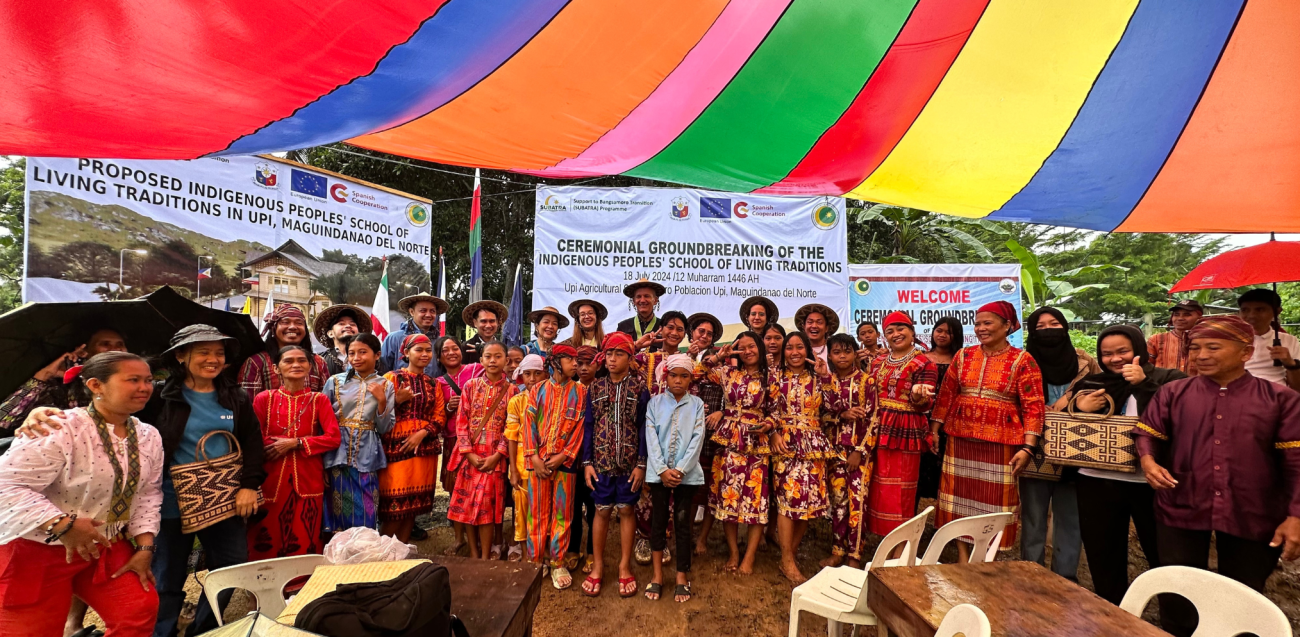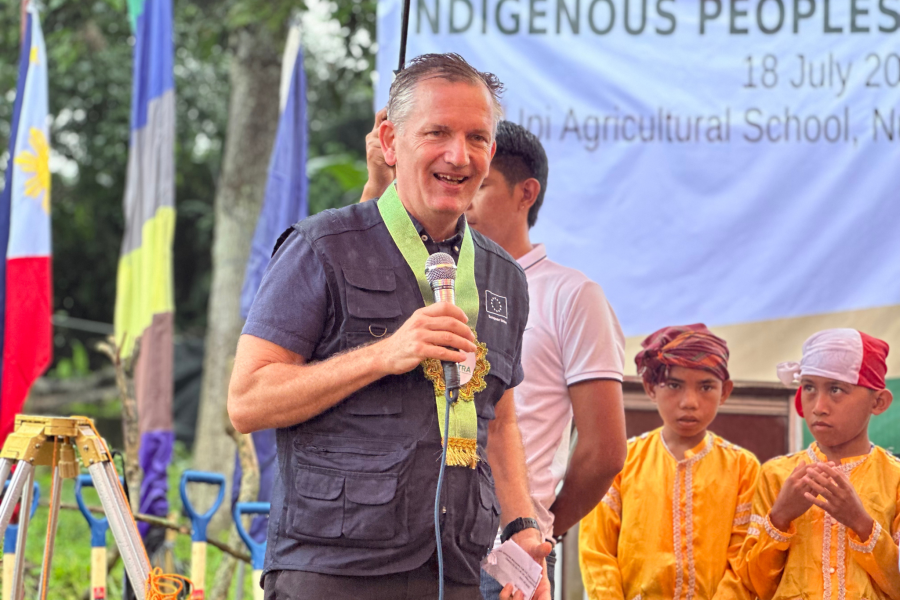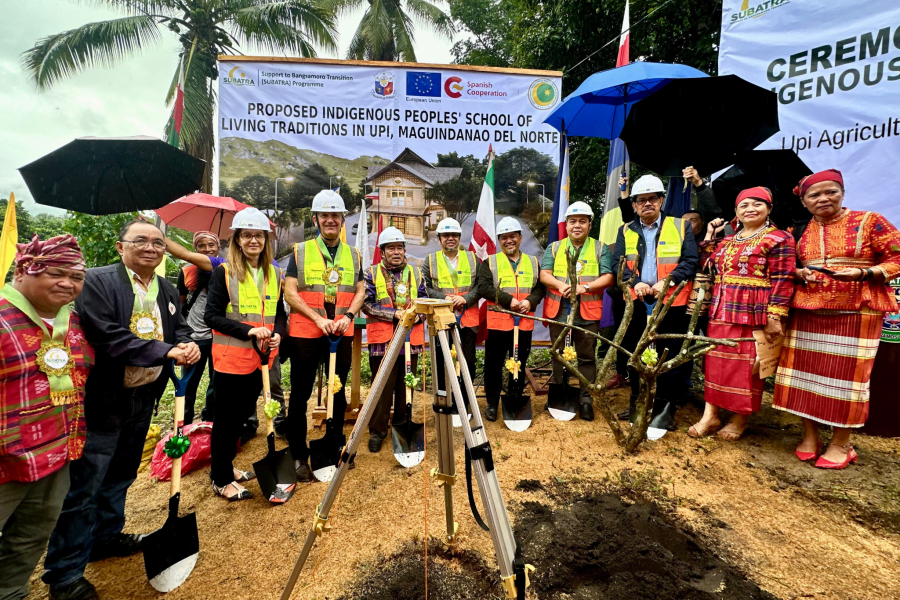EU and Bangsamoro Government break ground on indigenous peoples’ school to preserve cultural heritage in BARMM

New facility in Maguindanao del Norte to serve as a hub for cultural activities, skills training, and community gatherings, funded by the EU's SUBATRA Programme
- The new school aims to preserve and promote the rich cultural heritage of the Teduray tribe and other indigenous peoples in the Bangsamoro region.
- The facility will serve as a hub for cultural activities, conflict resolution, skills training, and community gatherings, promoting the rights and interests of indigenous peoples.
- Event highlighted the strong partnership between the EU, UNOPS and the Bangsamoro Government and their joint commitment to sustainable development and cultural preservation.
UPI, Maguindanao del Norte - The European Union, the Bangsamoro Government, and UNOPS joined forces today at the ceremonial groundbreaking for the Indigenous People’s School of Living Traditions in Upi, Maguindanao del Norte.
The design and construction of the new facility is funded by the EU’s Support to Bangsamoro Transition (SUBATRA) Programme, implemented by UNOPS in support of the Bangsamoro Government’s commitment to preserving and promoting the rich cultural heritage of the Teduray tribe and other indigenous peoples in the Bangsamoro Autonomous Region in Muslim Mindanao (BARMM). This facility also establishes a central hub for cultural activities, conflict resolution, skills training for livelihood, and community gatherings to promote indigenous peoples’ rights and interests in the BARMM.
As one of the implementing agencies for SUBATRA, UNOPS will lead the construction of the School of Living Traditions, ensuring the highest standards in resilient infrastructure in line with the UNOPS mission of helping communities build better lives and countries achieve peace and sustainable development.
The ceremony commenced with an indigenous ritual at dawn, followed by a formal program. Key speakers included Hon. Wilfredo Ibañez, Municipal Vice Mayor of Upi, who welcomed the guests, and Engr. Mohajirin T. Ali, SUBATRA Programme Director, who provided an overview of the project.
In his message, Programme Director Engr. Mohajirin T. Ali stressed that the project is a “testament to our commitment to preserving and promoting the rich cultural heritage of the Indigenous Peoples...ensuring that the unique identity and traditions of our indigenous peoples are passed down to future generations.”

EU Delegation to the Philippines’ Head of Cooperation, Christoph Wagner, reiterated the EU’s dedication to the Bangsamoro region. “Our commitment goes beyond infrastructure. It is about helping preserve the rich culture of indigenous peoples, and ensuring that they fully benefit from sustainable development initiatives of the Region,” Wagner stated.
In her remarks, UNOPS Head of Programme for East Asia and Pacific, Maria Cristina Palamini, shared her vision for the school. “UNOPS brings expertise in infrastructure, procurement, and project management to ensure that initiatives like the School of Living Traditions are delivered efficiently, effectively, and to the highest standards. Our goal is to celebrate indigenous culture while also creating sustainable livelihoods for the communities.”
Assistant Senior Minister Abdullah Cusain of the Bangsamoro Government emphasized the significance of the new school. “The School of Living Traditions is a significant step towards the preservation and promotion of our indigenous cultural heritage”, he said.
For his part, Minister Melanio U. Ulama, of the Ministry of Indigenous People’s Affairs (MIPA), stressed the importance of the school. “This initiative is vital for the Teduray tribe as it will help preserve our traditions and pass them on to future generations. It embodies our commitment to safeguarding our cultural identity”, Ulama stated.
Bangsamoro Transition Authority Parliament Member Ramon Piang and Executive Director for Bangsamoro Transformation Jordan Bayam of the Office of Presidential Adviser on Peace, Reconciliation, and Unity (OPAPRU), also delivered messages underscoring the importance of the project for the indigenous peoples.

The event culminated with a symbolic groundbreaking, led by Christoph Wagner, Assistant Senior Minister Abdullah Cusain, OPAPRU Executive Director for Bangsamoro Transition Jordan Bayam, Director General Mohajirin T. Ali, MP Ramon Piang, Vice Mayor Wilfredo Ibañez, UNOPS Head of Programme for East Asia and Pacific Maria Cristina Palamini, and Minister Melanio Ulama.

